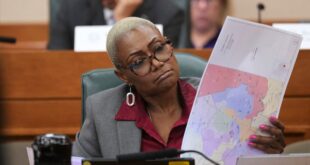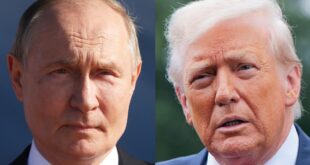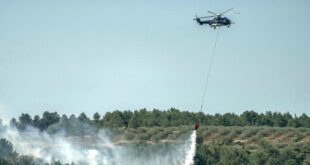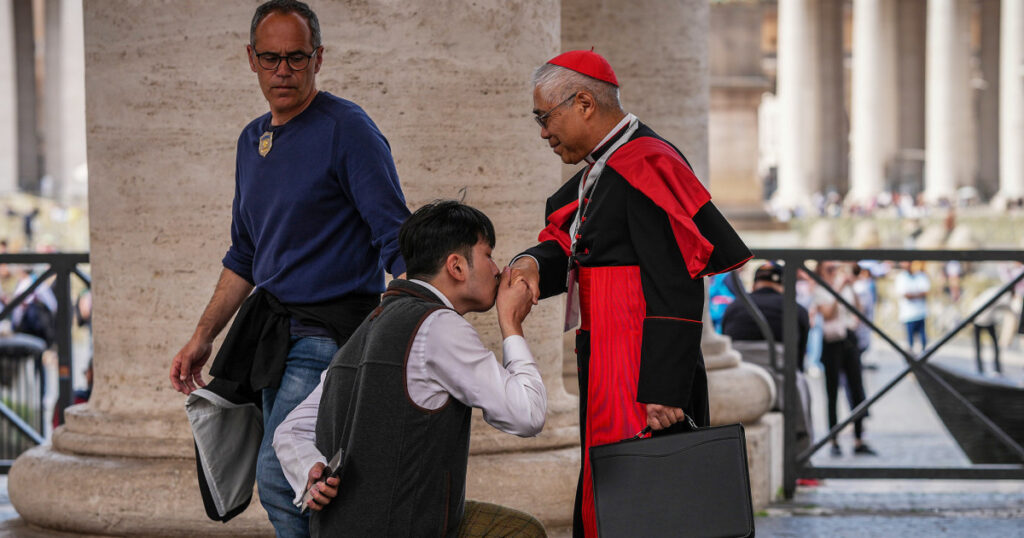
Given the stakes, extreme measures have been taken to avoid eavesdropping, not just sweeping the Sistine Chapel for bugs but shuttering its windows to prevent scanners from detecting vibrations of the cardinals’ words on the panes.
The electors must not only give up their cellphones, but are also encouraged to vote using disguised handwriting. They will stay in the H block-shaped St. Martha House, built in the 1990s. But these unglamorous, proletarian quarters will contrast with the day of pomp and high-ceremony that follows.
At 10 a.m. (4 a.m. ET) Wednesday the cardinals will swap their small zucchettos, or skullcaps, for tall, white miters woven with damask fabric. And Cardinal Giovanni Battista Re, dean of the college of cardinals, will then lead a Mass in St. Peter’s Basilica. In the afternoon, they will proceed from the Pauline Chapel into the Sistine Chapel, festooned with Michelangelo’s frescos, singing the Litany of Saints prayer or the hymn “Veni Creator Spiritus,” as they did in 2013.
In a scene depicted in 2024’s Oscar-nominated “Conclave,” Cardinal Diego Giovanni Ravelli, master for papal liturgical celebrations, will announce “extra omnes” — “everyone out” in Latin. All those not involved in the ballot, including cardinals over the age of 80, must leave.
The first poll that afternoon is often a chance to sound out front-runners and give token votes to friends and respected colleagues. That can backfire; in 1334, Cardinal Jacques Fournier, not seen as a serious candidate, was accidentally elected Pope Benedict XII.
Then there are four votes daily, two in the morning and two in the afternoon. After the final morning and afternoon votes, ballots are burned in a specially installed furnace and mixed with a specific compound of chemicals depending on the result: black smoke for no decision, white for a two-thirds majority and a new pope — “Habemus Papam!” (“We have a pope!”).
While some conclaves have taken hours, in recent history they’ve lasted two to three days. Few foresee a repeat of the longest conclave, in 1268-71, in which the townsfolk became so exasperated with the deadlocked cardinals that they locked the doors, tore off the roof and fed the cardinals nothing but bread and water until they made a decision. Hence the term “conclave,” meaning “with key” — i.e., a lock-in.
This time, the favorites among bookmakers like Polymarket is Cardinal Pietro Parolin, 70, Francis’ secretary of state who is seen as a centrist stabilizer. He is also top choice for the some 60,000 players of Fantapapa, or Fantasy Pope, which mirrors sports-based draft games and allows people to select their top 11 most likely pontiffs.
However, Parolin has faced significant criticism over a 2018 deal he engineered giving the Chinese Communist Party control over bishop appointments in exchange for greater freedom for worshipers.
Behind him is Cardinal Luis Antonio Gokim Tagle, 67, of the Philippines, often dubbed “the Asian Pope Francis” because he holds progressive views and champions the poor.
“We would be so happy if he was elected,” Ida Del Rosario, 72, of Manila, said of Tagle. She spoke to NBC News as she took selfies with her husband, Rody, 69, outside the Basilica during a 12-day trip to Europe. “He is very modern yet very holy — he is able to mix those two perspectives.”
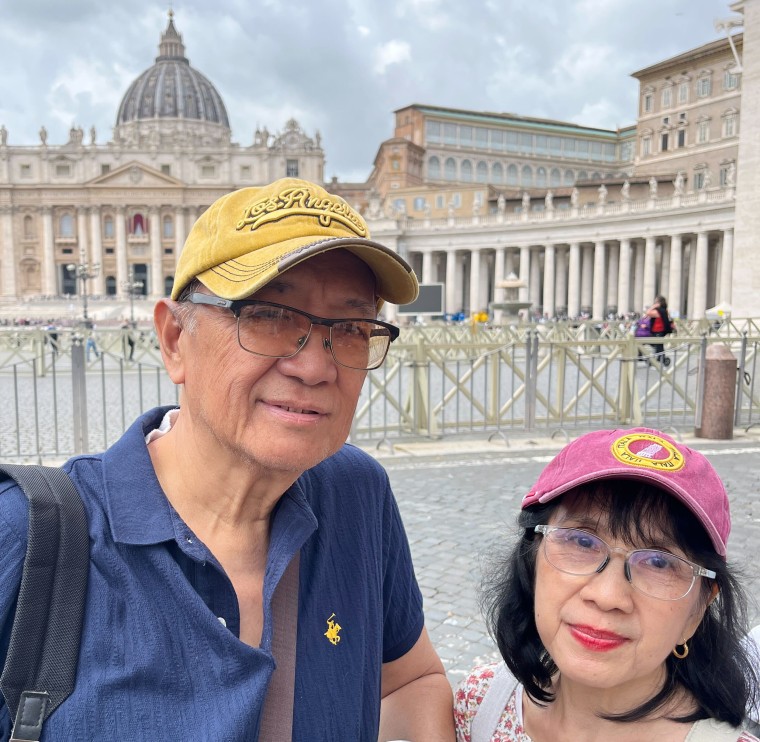
Not everyone would be happy with those choices.
BishopAccountability.org, a Massachusetts-based church watchdog, said Friday of Parolin that “no church official in the world has played such a central role in keeping hidden information about sexual crimes within the Vatican.” And it accused Tagle of being “ineffective” at combating abuses in his native Philippines.
In a statement the same day, the Catholic Bishops’ Conference of the Philippines said Tagle advocated for a church that “acts decisively to protect the vulnerable.” NBC News has requested comment from the Vatican.
Other contenders considered “papabile” include a conservative favorite, Péter Erdő, 72, of Hungary, and Cardinal Peter Turkson of Ghana, 76, who would be the first African pope in more than 1,500 years.
This can easily become an outsider’s game, with one local saying that “he who goes into the conclave a pope, comes out a cardinal.”
Whether front-runner or lesser-known, the red-cassocked cardinals are treated as rock stars and draw excited glances whenever spotted in the streets surrounding St. Peter’s.
“God bless and have a good day,” said Cardinal Frank Leo, archbishop of Toronto, approached by NBC News in Rome’s Borgo neighborhood, a warren of lanes and trattorias where these eminences, many of whom do not know one another, have been seen lunching in recent days.
“I really can’t say any more right now,” Leo said with a smile and a thumbs-up, leaving a group of young student-types open-mouthed when they realized who had just walked by.
The electors will pray for guidance, but the choice will ultimately rest with mortal men, Regoli, the professor and priest in Rome, said.
“There is often a spiritualization,” he said. “But this is an election like all the others in the world.”
 Latest World Breaking News Online News Portal
Latest World Breaking News Online News Portal


